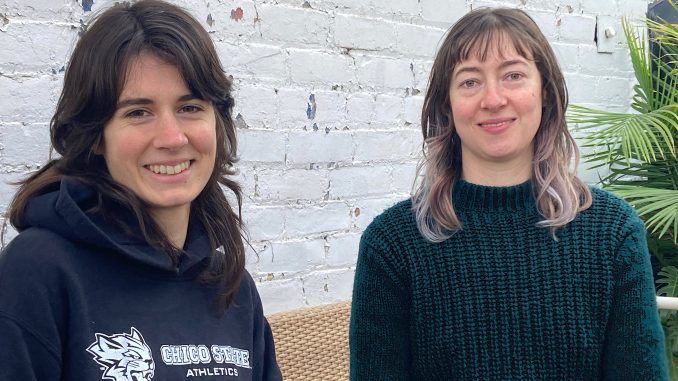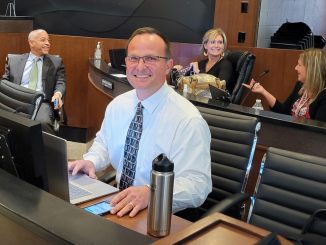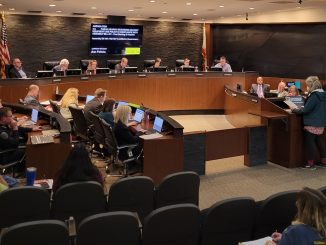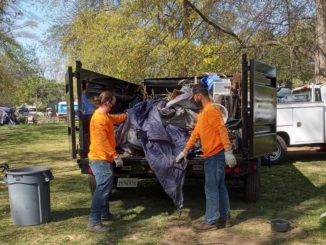
Hawley and Goldstein look to be seated on December 4th
By Ken Magri
According to the latest count from the Butte County Recorder-Clerk’s office, the open District 5 seat has candidate Katie Hawley leading contender Melissa Lopez-Mora by over 40 percentage points. In District 7, candidate Bryce Goldstein holds an 18 percentage point lead over Councilmember Deepika Tandon.
With around 4,000 provisional votes to still be considered county-wide, both Hawley’s and Goldstein’s district leads are considered insurmountable. Another election update is coming November 27th, and results are not official until December 3rd. Nevertheless, it appears that Chico voters are about to elect two new progressive city council members who will be at the December 4th meeting to help elect a new mayor.
Katie Hawley moved to Chico in 2018 and earned her first degree in Criminal Justice at Chico State University. Now a graduate student, she has completed her coursework and is writing her thesis for a Master’s degree in International Relations. Just 24, Hawley also works as a climate educator for a local non-profit environmental group, teaching children about composting and sustainability.
Bryce Goldstein, 29, graduated from Humboldt State University with a Bachelor’s degree in Environmental Sciences. She also holds a graduate certificate from San Jose State in High-Speed and Intercity Rail Management. Since moving to Chico in 2016, Goldstein has worked as a transportation planner and climate analyst. She has served on the city’s planning commission and climate action commissions.
Having two more progressives on the council is not enough to create a majority. But that possibility still remains, as well as who the council members will elect as Chico’s new mayor. Both determinations hinge on results of the District 3 race between conservative incumbent Dale Bennett and progressive challenger Monica McDaniel. Bennett currently leads by 72 votes, less than a percentage point.
The News & Review sat down with Hawley and Goldstein, asking about housing, homelessness, spending priorities, filling potholes, fire mitigation and the arts. But first, we wanted to know how they were inspired to run for political office.
CN&R: How did each of you get into politics?
Goldstein: I grew up in Redding and already in high school I saw a lot of issues around homelessness and people being cruel about poverty and living on the streets. I also got involved in environmental causes, especially in college studying environmental sciences.
I saw the same issues perpetuated anywhere I lived or visited; people who are homeless, corporations causing environmental harm, poverty, police brutality. There are a lot of issues that feel incredibly overwhelming that I can’t stand back from without trying to help in some way.
Hawley: I’ve been interested in politics for a long time; mostly international relations which is my true love. I only got interested in local politics when I saw Addison Winslow running two years ago. I have never seen anyone on a local level be so public-facing and talking about the issues I was interested in. He certainly planted the seed in my head, and said to start going to meetings. There is a lot of influence you can have on a local level, and although local politics isn’t where I anticipated seeing myself, I saw a need.
CN&R: Was it inevitable that a couple of seats would flip in this election?
Goldstein: I would say yes. The voter registration in Katie’s district and mine are overwhelmingly Democrat or progressive, so it would have been a big surprise if Katie or I didn’t win. We still had to work really hard to make sure that happened, so I wouldn’t say it was a foregone conclusion.
Hawley: For Bryce, that involved a lot of heavy canvassing. For me it was getting people to re-register to vote where they lived, and to distinguish myself. Someone who was younger than me ran. I guess that the tactic was for voters to be confused as to who was who, because a lot of her language was co-opted from my campaign language.
CN&R: What do you want to do first once the new city council convenes?
Hawley: It depends on whether we have a majority or not,but I am excited to get some power back to the boards and commissions. A lot of them have gone ad-hoc (meeting only when necessary). It’s important to have as much community input on policy decisions and boards and commissions are a part of that.
I’m also looking at the ten-year plan for Measure H funds allocations (a one percent raise in city sales tax, passed in 2022). It is largely to fix streets and improve our infrastructure. I live in District 5 and know how awful the roads are there. If you go to North Cedar it’s pretty crazy. You have to drive five miles per hour unless you want to damage your car. But we are prioritizing slurry-sealing at California Park and Amber Grove before looking at fixing south campus’ 3rd Street. To me that’s inequitable. District 5 has been neglected for a long time.
Goldstein: The first street that got paved with Measure H funds was Stilson Canyon Road, halfway in the county. Councilmember Tom van Overbeek happens to live there. There are around 20 houses and they are all owned by millionaires. Why are we not prioritizing streets that we have everybody in the community using? I think we should have a methodology for how we prioritize these roads.
CN&R: As new council members what do you think can be done to improve Chico’s homeless situation?
Hawley: I would like to find some agreement for multiple smaller scale managed campgrounds. It’s a lot less intimidating for communities to have 10-20 shelter beds. No neighborhood wants a homeless shelter, but I think we would have more success and leeway. I toured the pallet shelter and with the number of beds that they have, they have done an amazing job. But that’s not realistic to do at that scale in very many places in the city.
Goldstein: The local and regional Republican Partyuses homelessness as a wedge issue, and so they have no incentive in solving homelessness in any meaningful way. And that ties into the attack mailers where they sent out images of trashy homeless camps with needles and such. What do they have to fear-monger about if not homelessness?
CN&R: Do you have any new ideas for more affordable housing, like backyard cottages, duplexes multi-family units and what is called missing middle housing?
Goldstein: I think everyone agrees that we need more good housing that families want to stay in. Missing middle housing is really important for that. I could see some zoning changes to allow for more of the missing middle to be something non-partisan. Working with city staff, I want to make Park Avenue a place where you can build walkable mixed-use housing and businesses. Right now, we are seeing a lot of barriers to that, mainly with parking mandates.
Hawley: A lot of properties have become [vacation-rental] single family homes that sit vacant for five days a week, and then someone will rent it just for the weekend. That is a problem. There are reasons why people want short term rentals and I think we can balance that with the need for housing. A lot of coastal communities that are facing their properties being bought up for vacation rentals regulate it by limiting the number of permits or requiring that they be owner-occupied.
CN&R: Chico dodged a bullet this summer when the Park Fire headed northeast instead of west. But do you see fire mitigation within the city as an important concern?
Hawley: Yes. We have some fire breaks and do the goat-grazing, but there is more that can be done with star thistle burns and fields reduction. I don’t know [presumed Councilmember-elect] Mike O’Brien very well but he is very approachable and talks a lot about public safety. We were talking about wildfire management and managing city land. He might be an ally in that way.
Goldstein: I agree. Fire mitigation is very important and a lot of constituents have brought that up to me. We have a lot of creeks with overgrown brush. If there is a fire in one of those channels it could spread throughout the city. That should be a priority for every council member.
CN&R: Can we talk about public support for the arts in Chico?
Goldstein: That’s why I ended up here, essentially. I’m from Redding, and Chico was the place that had the live music, the arts, the cool stuff. That’s what sets Chico apart from other similar sized valley towns. So, if we don’t invest in our arts, we’re just a city.
Hawley: They just approved the signal box art, which was exciting. But I was a little annoyed by the discussion surrounding it. Some of the council members decided to criticize the vibrancy of some of the downtown murals and how they’ve ruined the aesthetic of our downtown, which I thought was funny. They said “we have to pick a non-controversial art topic. How about trees?”
CN&R: Who are you going to support for mayor?
Goldstein: I don’t know if we want to tell you right now. There are only going to be limited options. If the conservatives are in the majority, they are going to vote for a conservative mayor. I want a mayor who will facilitate meetings well and let people comment adequately. Those are some of my priorities.
Hawley: I will say it has been pretty frustrating at the meetings. I feel like more time is taken up because the [current] mayor and the public go back and forth. He feels they are talking about something that doesn’t fall into local jurisdiction, then there’s a ten-minute recess. But that’s just how public meetings are. There is no need to say that it’s off-topic.
Goldstein: We won’t have that same mayor, but I do worry that some people on the council will, if they are mayor, run the meeting similarly. I think we need to make sure we give people every minute. If something diverges from the topic at hand, I think that’s okay.




Be the first to comment